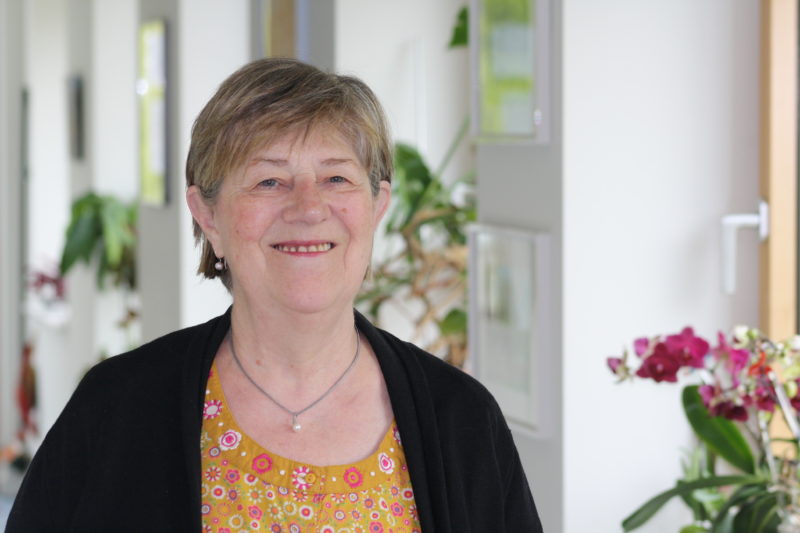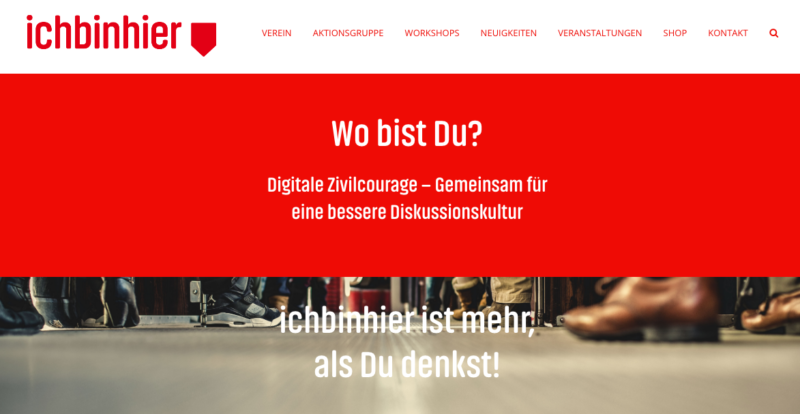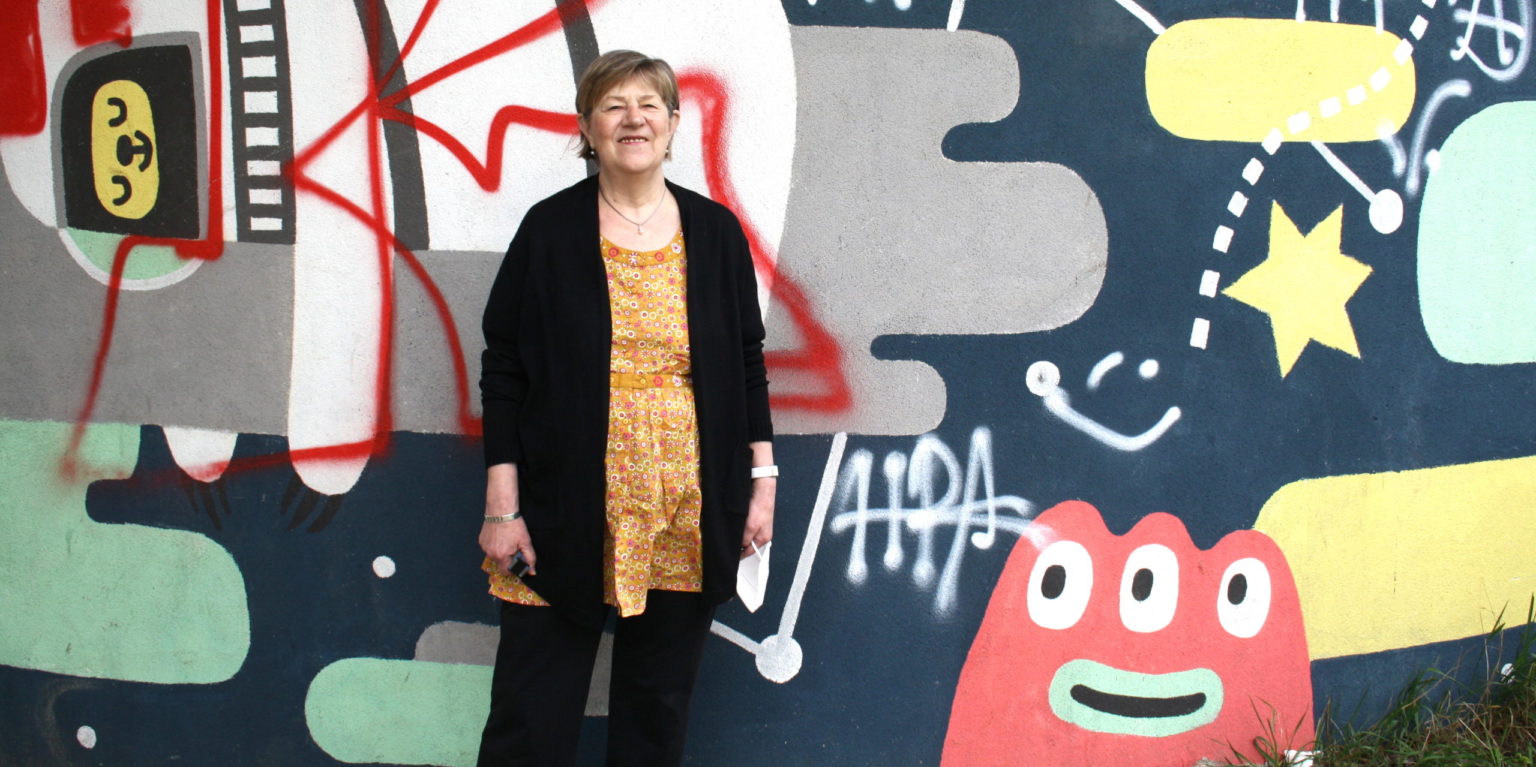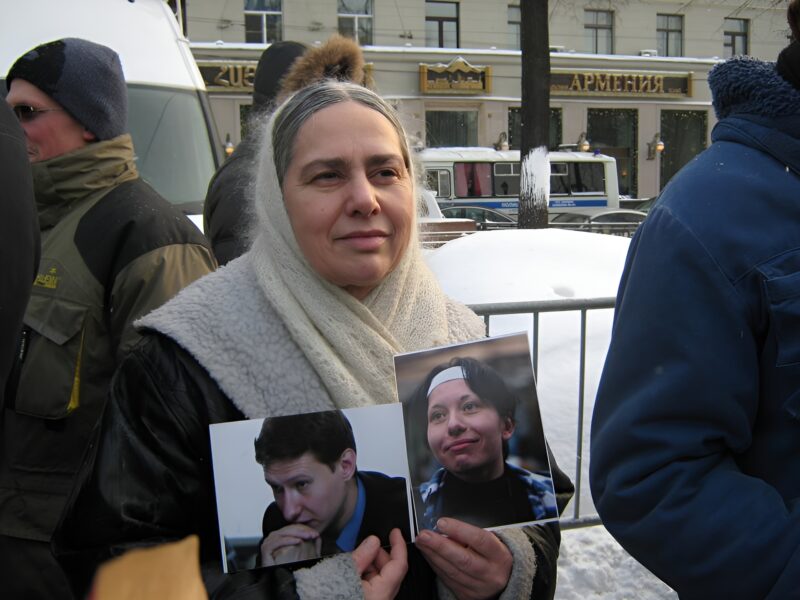Hate speech and defamation on the internet are on the rise. The targets are often women or social minorities. The “ichbinhier“, “iamhere“, association is fighting back with thousands of volunteers who tirelessly post comments on social networks.
By Anne Klesse, Hamburg
When articles about refugees, feminism or extremism appear on high-reach online news sites, Juliane Chakrabarti and her colleagues know they are in for a long, busy day. With certain topics, they can now predict that comments full of hate and agitation – sometimes even shitstorms lasting for days – will follow against individuals, especially if the articles are posted on social media. To counteract this, they are involved in the Hamburg-based association “ichbinhier”, which promotes a respectful culture of discussion online.
The association emerged from a closed Facebook group that was founded at the end of 2016. The idea originated in Sweden, where a similar group had already existed for a few months. The aim is to sensitise users of social networks, media representatives and political decision-makers to the issue in general.
Juliane Chakrabarti, born in 1951, has been with the programme since 2017. She herself became aware of a shitstorm against ZDF journalist Dunja Hayali. Since making a statement regarding the treatment of refugees in 2015, Hayali has repeatedly been subjected to the worst insults, slander and threats. This was also the case again and again in 2017.
“ichbinhier”, which had around 4,000 Facebook users at the time, stood by Hayali: volunteers left comments with the hashtag #ichbinhier to contradict the rumours and false allegations in the comment columns and at the same time made it clear that it is not okay to treat each other in a derogatory manner. Chakrabarti found: “A very meaningful activity, I asked to be allowed to join the same day.”
The group grew quickly and a non-profit organisation was to be founded. Chakrabarti, who has a degree in education, has worked for many years in associations and social organisations – most recently in the management of a municipal social enterprise that provides housing for refugees, the homeless and other people who find it particularly difficult on the housing market. She knows all about statutes, non-profit status and financing. She was elected to the board in 2017 and now runs the organisation together with founder Hannes Ley and Mira Loeblein.
“Civil courage has always been important to me,” says Chakrabarti. However, she used to have little time for voluntary work. She had her daughter and got married between finishing school and university. Her husband has since passed away. She lives with her daughter in a communal housing project in a district in the south of Hamburg that is otherwise labeled as a quarter of precarious living conditions. Those who can would rather leave, but Chakrabarti had helped to develop the former industrial wasteland as a counter-design to the old workers’ housing estates and to upgrade the neighbourhood itself and moved there from the popular Eppendorf district.

Online hate has already led to murder and terror
She obviously likes to set a good example. “When my daughter was little, I went to protests against nuclear power plants or the census. Later, there was little time for activism,” she says. As a pensioner, she now has the time and, with “ichbinhier”, has found an opportunity “where I can stand up for issues that are important to me without having to take to the streets in front of water cannons“. However, this work is no less dramatic.
The volunteers themselves are also repeatedly insulted in comments and threatened in private messages. Chakrabarti talks about an older friend in the organisation who became downright nauseous when she recently archived the many rape threats against herself. She is not afraid, but: Walter Lübcke, Halle, Hanau – three examples for her as to how hatred spilled over from the internet into real life and even led to people being murdered.
Here’s a brief reminder: Kassel District President Walter Lübcke was shot dead at his home in June 2019 after years of death threats from right-wing circles. In Halle, an armed right-wing extremist attempted to break into a synagogue in October 2019 and then killed a woman on the street and a man in a snack bar and seriously injured two other people. In Hanau, an attacker shot and killed nine people in a shisha bar in February 2020.
Few reporting centres for victims of hate speech on the internet
Only a few federal states have state reporting centres in the fight against hate crime on the internet. Hesse launched the first nationwide contact point in January 2020. The Federal Criminal Police Office refers to the “respect!” reporting centre based in Baden-Württemberg, where reports are checked nationwide, passed on to the platform operators and reported for criminal prosecution. A new package of laws also came into force in spring: online insults can now be punished with up to two years in prison. The penalties for online threats of murder and rape have been increased to up to three years in prison.
From February 2022, social networks will not only have to delete such content, but also report it to the Federal Criminal Police Office, including the IP address. Critics doubt that this will work. Others are concerned about freedom of expression, while the provisions do not go far enough for others. But at least those affected now have an opportunity to defend themselves legally. They can still receive support at any time from initiatives such as “ichbinhier” or “HateAid”, a non-profit organisation based in Berlin that helps victims of digital violence with free advice and funding for legal costs, among other things.
In addition to people with a migration background, politicians, Muslims and refugees, women in particular are frequent targets of such attacks online. This has been shown in a number of studies, including the 2019 research report by the Institute for Democracy and Civil Society. A study by the aid organisation Plan International on digital violence, which surveyed 14,000 girls and young women in 22 countries, found that 58% had already experienced threats, insults and discrimination. In Germany, the figure is as high as 70 per cent.

These experiences led to psychological suffering for many of those affected and caused them to change their behaviour on social channels: they use the platforms less often, express their opinions less or leave the respective network altogether. This suppression is intentional on the part of the haters, say experts such as Juliane Chakrabarti. “The systematic hostility towards the Green Party candidate for chancellor, Annalena Baerbock, is an example of how women are pushed out of the internet. It’s often about spreading narratives and determining reporting.”
She is convinced: “Once we give up the space, it’s gone. We notice it in countries like Hungary, Poland, Russia and the USA and how quickly anti-feminist movements spread there.” According to HateAid, the violence experienced by women online is very different from that experienced by heterosexual white men: “The violence directed against women online is often sexualised and misogynistic. This means that perpetrators attack women solely because of their gender. The content that women have previously disseminated, posted or liked in these cases is often irrelevant.”
Silent readers available for arguments and tips
The “ichbinhier” association has divided haters into three categories: A large proportion are silent readers who do not comment themselves but are susceptible to conspiracy myths and the like. “We call another group the trolls. They are often bored and suffer from the fact that they have no meaning. They are driven by a desire for attention,” says Chakrabarti. And then there are those with a political programme, among them the association counts so-called lateral thinkers. The latter are probably the least accessible for arguments and are sometimes violent in real life. “Many are fuelled by anger, annoyance and frustration about what is not going well in their lives.”
To actively counter this, volunteers scan the websites with the highest reach, such as t-online, Focus Online, Spiegel.de, Welt.de and Bild.de, between 6 am and 10 pm. “As soon as an article has more than 30 per cent hate and stirring-up comments within 15 minutes, we call on our community to take action,” says Chakrabarti. Volunteers then write comments that draw the moderators’ attention to insults. They point out misleading or false claims and argue against them. There are no rules or guidelines, it’s largely self-directed.
The “ichbinhier” creators were honoured with the prestigious “Grimme Online Award” for their work in 2017, while initiator Hannes Ley received the Federal Cross of Merit on behalf of the organisation in 2018. The non-partisan network now has 44,000 active members. There are slightly more women than men, more than half come from psychosocial professions, more than 70 per cent have previously worked as volunteers and have experienced hate speech themselves.
Juliane Chakrabarti is convinced that it is important for those affected to realise that they are not alone. This will probably not convince most haters, but perhaps the silent readers. For the activist, it is above all the signal that counts: “For me, standing up against something online is like standing up on a train and telling someone who is insulting another passenger to stop!”












